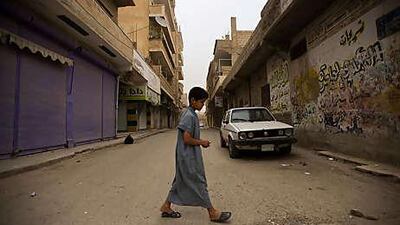RAQQA, SYRIA // Walking through the dusty main souk in Raqqa city, searching for signs of its past, Mahmoud Nejris looked at the crudely functional concrete buildings lining the streets, and he cursed. "Cement changed everything," he said. "It killed traditional construction and damaged the face of the community. Of course I'm against it. Our identity was enshrined in those old buildings and today we are losing that identity."
A dentist with a small clinic in Raqqa, Mr Nejris is more renowned as a local historian, an avid hoarder of artefacts and information. The walls of his clinic's waiting room are covered with ceramic pots, tools, old weapons and copies of documents written during Arab rebellions against the Ottoman Empire, the British and the French. In one of the souk's side streets, not far from his clinic, the dentist-historian found what he was looking for - a mud brick wall with three wooden doors set into it.
"This is what's left," he said sadly. "Not so long ago it was a place for local handicrafts, carpets, tools and things for the house. Now nothing is really made here." Even the few collectables sold in the market are a testament to modernisation. The hand-stitched rugs tacked together from old clothes, woven-wheat bags and fire-scarred cooking pots are traded in by rural families who are slowly replacing them with factory made equivalents, usually imported from Turkey and China.
"Some people think that everything old is useless," Mr Nejris said. "They are affected by a sort of western mindset. Then there are those at the opposite extreme. They want everything to be old. I'm not saying we should be stuck in the past, but we need the right mix that respects traditions and doesn't prevent modernisation." It is a common dilemma, but in Raqqa memories of the old ways of life remain fresh. Modernising trends arrived suddenly and comparatively late. Electricity came to the city only in 1976 and the rush to develop meant that cement buildings replaced the mud variety with such speed that, for today's tourists, authorities have built a concrete replica because the original structures are gone.
Some 80 km outside of Raqqa city lives Abdul Aziz Gaishesw, a Bedouin sheikh from the E'nizar tribe. Like many of his peers, he holds Saudi citizenship despite being born in what is now Syria, and freely divides his time between the two countries, viewing them both as home. It is a reminder that, in the recent past, the borders of the Middle East's modern nation states did not exist and the Bedouin tribes roamed throughout the Arabian peninsula and Levant.
"When I was very young, we still lived in a tent but my father was the first to build a stone house here, with a wooden roof, back in 1935," he said, sitting in the tribal reception room he keeps open 24 hours a day. He wants it available to any passing visitors who need somewhere to stay - a custom he insists must not be allowed to wither. Sheikh Gaishesw had an unsentimental view of modern history, saying he experienced enough of the past to know its flaws first hand.
"There used to be one doctor in the area, now there are hundreds. In the old days the Bedouin were not educated, they couldn't read, there were no schools. Now our children can hope to grow up to be lawyers, judges, engineers," he said. "Today, people lead better lives, easier lives. Before, it was just struggle. We settled the land, it was modern cultivation methods that changed everything." The tribes themselves, while still a key element of society, are less important than they once were. Tribal leaders remain highly respected and are the first arbitrator in disputes between families or over land. Yet, where once the sheikh's word was final, now, if either party is not happy with his decision, they can take the matter to court.
Change, while rapid, has been far from universal. It has also been largely unplanned and, aside from the physical appearance of crude cement block buildings, it has not always been successful. Syria's agriculture boom in the 1980s - Raqqa governate is part of the nation's breadbasket - has been unsustainable, leading to abuse of scarce water resources that may have crippling long-term effects. Rural poverty remains rife, exacerbated by a recent three-year drought, and many children are at best partially educated.
Unemployment is high, investment in industry low, and some traditions, such as so-called honour killings against women deemed to have sullied the family name, still take place. But Raqqa also has something of a reputation for producing artists, poets and writers. One of them, Fawzia al Ma'ari, said that culturally there had been advances, particularly in terms of women's rights. However, significant problems remained.
"Compared to when I was a girl, there have been improvements, no doubt about it," she said. "Girls can have aspirations that were once impossible. But opportunities are very limited and a lot of women here are stuck in unhappy lives, as the property of men." It is the pressing need to lift people's economic standing that concerns Adnan al Sokghnee most. The provincial governor, appointed directly by President Bashar al Assad, said he was "positive" about the future but under no illusions about the daunting scale of the task ahead.
"We need modern irrigation systems for agriculture. We need to focus on sustainable energy. We need to speed up reform of the economy and there needs to be administrative reforms," he said. "And we need a new mentality. "We are still at the beginning of this project. We are working on it. But we will succeed, I'm sure of that." psands@thenational.ae

